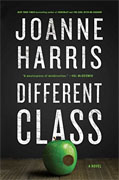Different Class
Joanne Harris
book reviews:
· general fiction
· chick lit/romance
· sci-fi/fantasy
· graphic novels
· nonfiction
· audio books
· author interviews
· children's books @
curledupkids.com
· DVD reviews @
curledupdvd.com
newsletter
win books
buy online
links
home
for authors
& publishers
for reviewers

 |
Different Class Joanne Harris Touchstone Hardcover 416 pages January 2017 |
|
I'm of two minds about Harris’s Different Class
Roy and St. Oswald’s are dominated by the past, a murky minefield of emotional clutter that once centered on flamboyant and friendly teacher, Harry Clarke. Harry died years ago, but his ghost lives on--not just in Roy, but also in someone writing a strange and twisted diary to a boy called Mouser. The journal traces back to the events of 1981 and the murder of a boy whose body was found in the Clay Pits, a series of abandoned quarries not far from St. Oswald’s. The narrator talks about his friendship with Harry Clarke and his classroom half-full of boys including Goldie, Poodle, and little Johnny Harrington, a “pale-faced, bland, insufferable boy.” The boys would spend many afternoons in Harry’s office listening to Pink Floyd LPs while drinking tea, watering his plants, and tidying bookshelves. In 2005, Harrington is far from the boy that Roy remembers. With his impeccable uniform and his air of “barely concealed contempt,” the arrogant, sullen boy has been reborn as a smiling, smooth-voiced politician returned after twenty years’ absence “to inflict fresh misery” on Roy. In a novel already crowded with intricate twists and turns, there’s a constant hint of veiled contempt. Roy, years later, finds himself attempting to solve the murder of Charlie Nutter, who was last seen less than a hundred yards away from Harry’s house on Parkside Road. Harry was unjustly blamed for the Charlie’s murder. As Roy’s memories blur and shift and recede with time, Harry’s injustice is the one memory that stays poignant and most persistent in Roy’s life. Harris’s novel ricochets between dark thoughts, dark deeds, and the memories of lost boys: Scones, Straits, Colin Knight, Charlie Nutter (“who was one of ours”), and Lee Bagshot (“who was not”). All of them were victims, scarified to the “spirit of dark and lonely water.” Crusty, aging Roy proves to be a most moral protagonist, a man stranded in limbo as he fights with Harrington and his new staff, who want him to retire. Roy is neither victim or victimizer but faced with yet another predicament of the sins of the flesh. Like Roy, the rest of the teachers are old relics, pretty much adhering to the stereotype.
Part of the old guard, uncomfortable discussing homosexuality, they relentlessly try to avoid the topic in the few passages where gay issues occur. Aside from the mystery elements, Different Class Keen, rueful humor brings much-needed perspective to St Oswald’s stifling atmosphere. In a world of possession and evil thoughts, the story turns on fear, suspicion, and a group of lads who have learned to manipulate these levers to make adults afraid of them. The novel reaches a devastating, bloody climax, but at least poor Roy is vindicated, saved by the bell to teach another day. Originally published on Curled Up With A Good Book at www.curledup.com. © Michael Leonard, 2017 |
| Also by Joanne Harris: |
|
|
|
 Click here to learn more about this month's sponsor! |
|
| fiction · sf/f · comic books · nonfiction · audio newsletter · free book contest · buy books online review index · links · · authors & publishers reviewers |
|
| site by ELBO Computing Resources, Inc. | |
 Like an old ship crashing onto the rocks, Roy and the other perennial teachers find their lives upended when the New Super Head, Johnny Harrington, is appointed to drag St. Oswald’s into the 21st century, particularly
by a series of dreadful events involving the murder of a school boy and the ensuing scandal. With the help of computers, management courses, and “internal assessments,” Roy finds himself sinking, frightened for his back, and challenged by the gnawing conviction that his age-old subject will be deleted from the curriculum: “what would I do without the perpetual soap opera of St Oswald’s to sustain. Me. My Brodie Boys. Who else could look after them.”
Like an old ship crashing onto the rocks, Roy and the other perennial teachers find their lives upended when the New Super Head, Johnny Harrington, is appointed to drag St. Oswald’s into the 21st century, particularly
by a series of dreadful events involving the murder of a school boy and the ensuing scandal. With the help of computers, management courses, and “internal assessments,” Roy finds himself sinking, frightened for his back, and challenged by the gnawing conviction that his age-old subject will be deleted from the curriculum: “what would I do without the perpetual soap opera of St Oswald’s to sustain. Me. My Brodie Boys. Who else could look after them.”